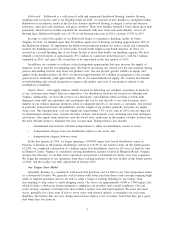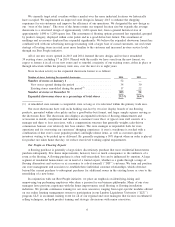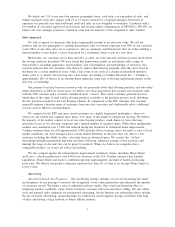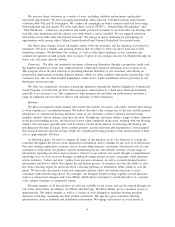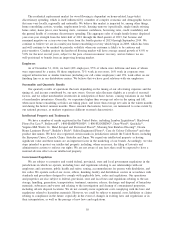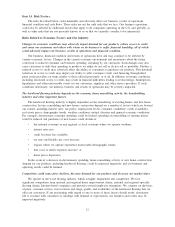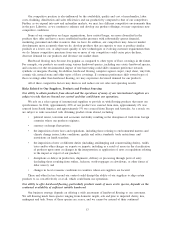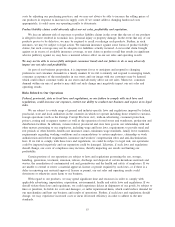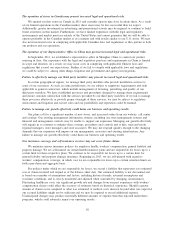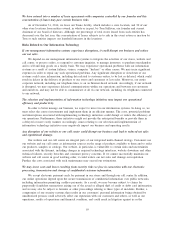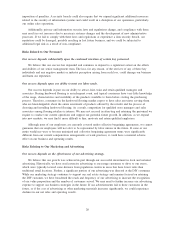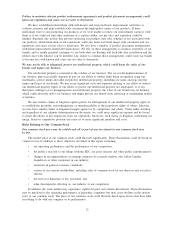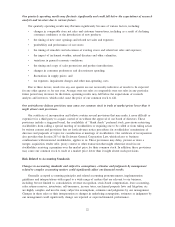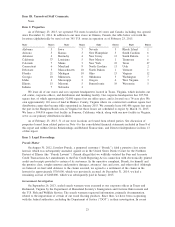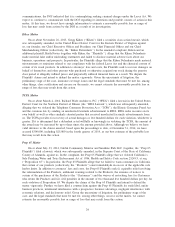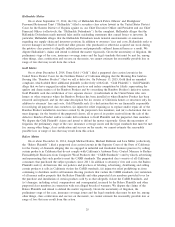Lumber Liquidators 2014 Annual Report Download - page 23
Download and view the complete annual report
Please find page 23 of the 2014 Lumber Liquidators annual report below. You can navigate through the pages in the report by either clicking on the pages listed below, or by using the keyword search tool below to find specific information within the annual report.costs by adjusting our purchasing practices, and we may not always be able to increase the selling prices of
our products in response to increases in supply costs. If we cannot address changing hardwood costs
appropriately, it could cause our operating results to deteriorate.
Product liability claims could adversely affect our net sales, profitability and reputation.
We face an inherent risk of exposure to product liability claims in the event that the use of our products
is alleged to have resulted in economic loss, personal injury or property damage. In the event that any of our
products proves to be defective, we may be required to recall or redesign such products. Further, in such
instances, we may be subject to legal action. We maintain insurance against some forms of product liability
claims, but such coverage may not be adequate for liabilities actually incurred. A successful claim brought
against us in excess of available insurance coverage, or any claim or product recall that results in significant
adverse publicity against us, may have a material adverse effect on our net sales and operating results.
We may not be able to successfully anticipate consumer trends and our failure to do so may adversely
impact our net sales and profitability.
As part of our business proposition, it is important for us to anticipate and respond to changing
preferences and consumer demands in a timely manner. If we fail to identify and respond to emerging trends,
consumer acceptance of the merchandise in our stores and our image with our customers may be harmed,
which could reduce customer traffic in our stores and adversely affect our net sales. Moreover, consumer
demand within our mix of products may shift and such change may negatively impact our net sales and
operating results.
Risks Related to Our Operations
Federal, provincial, state or local laws and regulations, or our failure to comply with such laws and
regulations, could increase our expenses, restrict our ability to conduct our business and expose us to legal
risks.
We are subject to a wide range of general and industry-specific laws and regulations imposed by federal,
provincial, state and local authorities in the countries in which we operate including those related to customs,
foreign operations (such as the Foreign Corrupt Practices Act), truth-in-advertising, consumer protection,
privacy, zoning and occupancy matters as well as the operation of retail stores and warehouse, production and
distribution facilities. In addition, various federal, provincial and state laws govern our relationship with and
other matters pertaining to our employees, including wage and hour laws, requirements to provide meal and
rest periods or other benefits, health care insurance issues, minimum wage standards, family leave mandates,
requirements regarding working conditions and accommodations to certain employees, citizenship or work
authorization and related requirements, insurance and workers’ compensation rules and anti-discrimination
laws. If we fail to comply with these laws and regulations, we could be subject to legal risk, our operations
could be impacted negatively and our reputation could be damaged. Likewise, if such laws and regulations
should change, our costs of compliance may increase, thereby impacting our results and hurting our
profitability.
Certain portions of our operations are subject to laws and regulations governing the use, storage,
handling, generation, treatment, emission, release, discharge and disposal of certain hazardous materials and
wastes, the remediation of contaminated soil and groundwater and the health and safety of employees. If we
are unable to extend or renew a material approval, license or permit required by such laws, or if there is a
delay in renewing any material approval, license or permit, our net sales and operating results could
deteriorate or otherwise cause harm to our business.
With regard to our products, we may spend significant time and resources in order to comply with
applicable advertising, importation, exportation, environmental, health and safety laws and regulations. If we
should violate these laws and regulations, we could experience delays in shipments of our goods, be subject to
fines or penalties, be liable for costs and damages, or suffer reputational harm, which could reduce demand for
our merchandise and hurt our business and results of operations. Further, if such laws and regulations should
change, we may experience increased costs or incur decreased efficiency in order to adhere to the new
standards.
15


